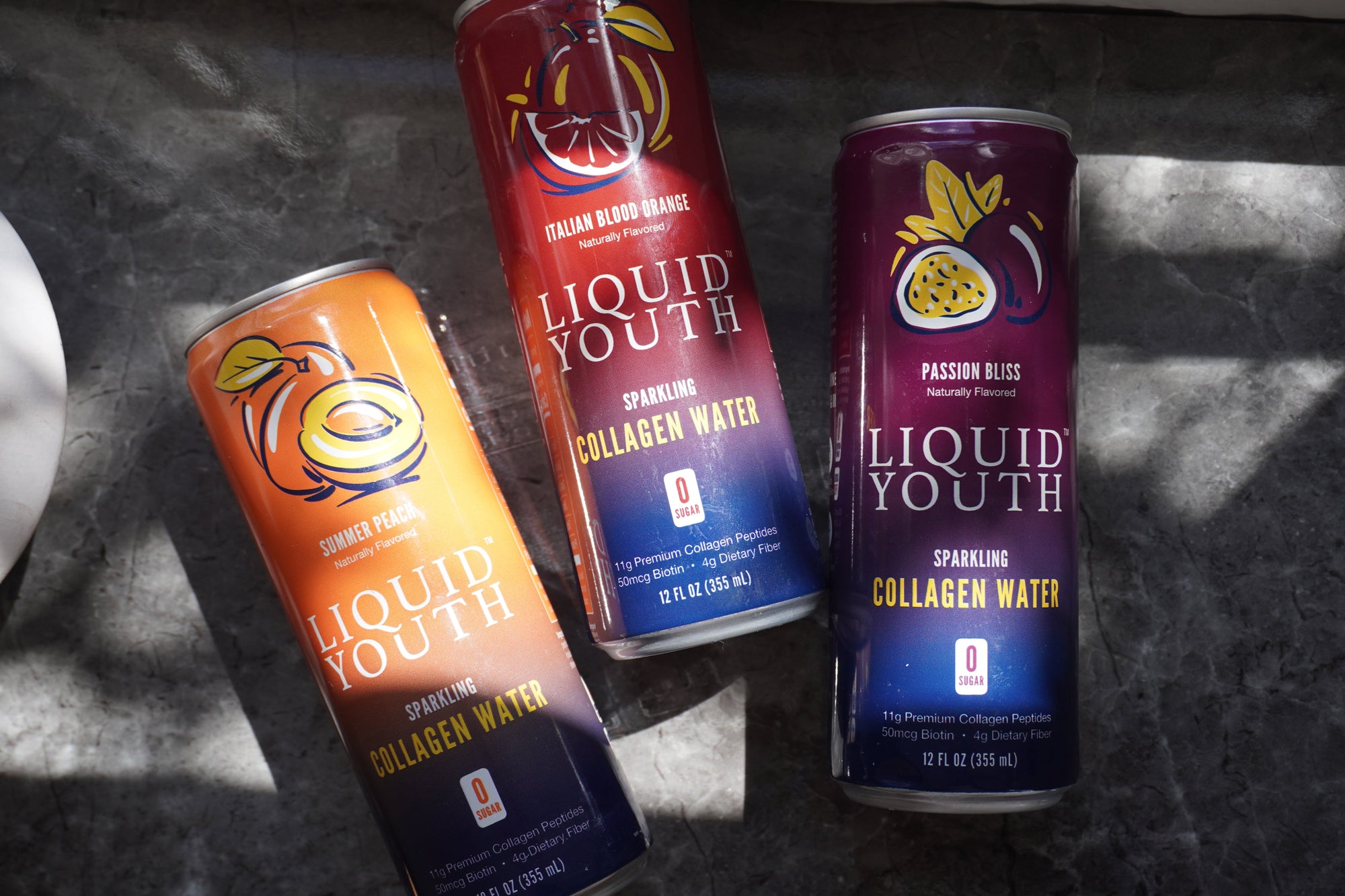Key Points:
-
As estrogen declines, collagen levels drop rapidly—up to 30% in the first five years post-menopause—leading to thinner, drier, and less elastic skin. Supplementing with collagen peptides may help support the body’s natural collagen production, offering a non-hormonal way to care for aging skin.
-
Clinical research has shown that oral collagen supplements, especially when combined with antioxidants like Vitamin C, may improve skin appearance, reduce wrinkle depth, and enhance dermal structure within 8–12 weeks.
-
Products like Liquid Youth Sparkling Collagen Water contain collagen peptides with convenience and flavor—encouraging sustainable beauty habits that are easy to integrate into a daily routine for women navigating menopause and beyond.
Can you Keep Your Glow After Menopause?
By the time most of us hit our 40s or 50s, we start noticing those sneaky little changes in the mirror—lines where there used to be smoothness, skin that feels a bit thinner, and that dewy glow slowly packing its bags. In addition to a healthy diet, good sleep, and stress reduction, additional support can come through the help of collagen peptides. Collagen peptides, especially in sparkling water form, are bubbling up in the beauty world for their potential to support skin during menopause.
Let’s unpack what collagen actually is, what goes down during menopause (besides estrogen levels), and how collagen peptides might help you build a collagen habit for glowing skin—yes, even after 50.
What Is Collagen and Why Does It Matter for Your Skin?
Think of collagen as the mattress springs of your skin. It gives structure, bounce, and keeps things from sagging. It’s the most abundant protein in your body, making up 75–85% of your skin’s dry weight. Collagen keeps your skin firm, elastic, and wrinkle-free... at least for a while.1
Your fibroblast cells are the unsung heroes producing collagen, elastin, and the moisture-locking molecules that keep skin supple. These are specialized skin cells located in the dermis—the thickest layer of your skin—and they play a key role in wound healing and maintaining the skin’s structural framework. Think of them as your skin’s construction crew, constantly working behind the scenes to repair and rebuild. But by your mid-20s, production starts slowing—like a factory cutting shifts. We lose about 1–1.5% of collagen each year.2 Add in sun damage, pollution, and, well, life, and it’s no wonder things start shifting south.
The Menopause-Collagen Connection
Here’s the plot twist: once menopause hits, collagen doesn’t just gradually decline—it may plummet. Research suggests we lose up to 30% of our skin’s collagen in the first five years after menopause. After that? It may continue to decline by 2% each year.3,4
This can lead to:
-
Fine lines and deeper wrinkles
-
Dry, thinner skin
-
Loss of elasticity
Estrogen plays a major role in keeping skin plump and hydrated. When it dips, skin often feels like it went from lush sponge to dry cracker.
What Are Collagen Peptides?
Okay, here’s the science-y part (but we’ll keep it fun). Collagen peptides are tiny bits of protein, broken down from larger collagen molecules, so your body can absorb them. Once you drink or eat them, they may travel through your bloodstream and support the fibroblasts—the very cells that create new collagen, elastin, and hyaluronic acid.5
Basically, collagen peptides are like a memo to your skin cells that says, “Hey! Time to get back to work!”
Can Collagen Peptides Support Menopausal Skin?
Short answer: They might. And there's science to back that up.
Several studies suggest collagen supplements may improve hydration, elasticity, and even reduce wrinkle depth. One study showed participants had smoother, plumper skin after just 8 weeks of daily collagen peptides.6
In another review, women who took collagen peptides saw potential improvements in skin density and firmness, especially when combined with antioxidants and vitamins .7
So, while it’s not a magic potion, adding collagen to your daily routine can support your skin’s natural repair process—kind of like sending in a gentle army to patch up the wear and tear.
What About Hormones? Isn’t HRT the Gold Standard?
HRT (Hormone Replacement Therapy) can absolutely help with some skin issues. Estrogen boosts collagen, hydration, and skin thickness.8 But not everyone can or wants to take hormones.
That’s where collagen peptides step in as a hormone-free, low-risk option that may offer skin-supporting benefits—no prescriptions required.
Antioxidants + Collagen = Power Couple
Just like peanut butter needs jelly, collagen works better when paired with antioxidants like Vitamin C and biotin. Vitamin C helps stabilize new collagen, and biotin supports healthy skin, hair, and nails.
Plus, antioxidants help block the pesky enzymes (like MMPs) that break down collagen in the first place.9
Liquid Collagen: Why Sip Instead of Scoop?
Here’s the truth: powders can be messy. Capsules? Easy to forget. But a sparkling, delicious collagen drink? That’s a vibe. Plus, drinking collagen can be a fun, effortless part of your routine—like that fancy skincare serum, but from the inside.
Liquid Youth Sparkling Collagen Water: The Glow-Up Drink
If you’re thinking about how to build beauty habits that actually stick, a daily collagen routine might be your new best friend, especially when it’s easy and tastes amazing.
Why Women Are Loving Liquid Youth:
-
11g of premium grass-fed bovine collagen peptides per can
-
May support skin, hair, nails, joints, and gut health
-
Crafted to help enhance youthfulness from within
-
Available in three crave-worthy flavors: Passion Bliss, Italian Blood Orange, and Summer Peach
-
Zero sugar, no fake stuff, no preservatives
-
50 mcg biotin + 4g dietary fiber for a beauty and gut-friendly bonus
Whether you’re tackling menopausal skin or just want a beauty boost, this sparkling collagen water could make your daily collagen habit not just doable—but delicious.
Bottom Line: Is Collagen Your Midlife Skin Secret?
Aging happens (and gracefully, we say!). But if you’re looking to support your skin as hormones shift, collagen peptides may offer real benefits backed by science. They won’t erase every wrinkle, but they might help you glow a little brighter and feel a bit more you.
So go ahead, crack open a can of Liquid Youth, build that daily collagen routine, and give your skin the love it deserves—from the inside out.
Because glowing skin isn’t just a trend—it’s a habit.
References
1 David, M. R. & Jennifer, L. Skin collagen through the lifestages: importance for skin health and beauty. Plastic and Aesthetic Research 8, 2 (2021). https://doi.org/10.20517/2347-9264.2020.153
2 Tobin, D. J. Introduction to skin aging. J Tissue Viability 26, 37-46 (2017). https://doi.org/10.1016/j.jtv.2016.03.002
3 Brincat, M. et al. Skin collagen changes in post-menopausal women receiving oestradiol gel. Maturitas 9, 1-5 (1987). https://doi.org/10.1016/0378-5122(87)90045-4
4 Reilly, D. & Lozano, J. Skin collagen through the lifestages: importance for skin health and beauty. Plastic and Aesthetic Research 8 (2021). https://doi.org/10.20517/2347-9264.2020.153
5 Edgar, S. et al. Effects of collagen-derived bioactive peptides and natural antioxidant compounds on proliferation and matrix protein synthesis by cultured normal human dermal fibroblasts. Sci Rep 8, 10474 (2018). https://doi.org/10.1038/s41598-018-28492-w
6 Proksch, E. et al. Oral supplementation of specific collagen peptides has beneficial effects on human skin physiology: a double-blind, placebo-controlled study. Skin Pharmacol Physiol 27, 47-55 (2014). https://doi.org/10.1159/000351376
7 Sibilla, S. & Borumand, M. Effects of a nutritional supplement containing collagen peptides on skin elasticity, hydration and wrinkles. Journal of Medical Nutrition and Nutraceuticals 4, 47 (2015). https://doi.org/10.4103/2278-019X.146161
8 Affinito, P. et al. Effects of postmenopausal hypoestrogenism on skin collagen. Maturitas 33, 239-247 (1999). https://doi.org/10.1016/s0378-5122(99)00077-8
9 Pullar, J. M., Carr, A. C. & Vissers, M. C. M. The Roles of Vitamin C in Skin Health. Nutrients 9 (2017). https://doi.org/10.3390/nu9080866



